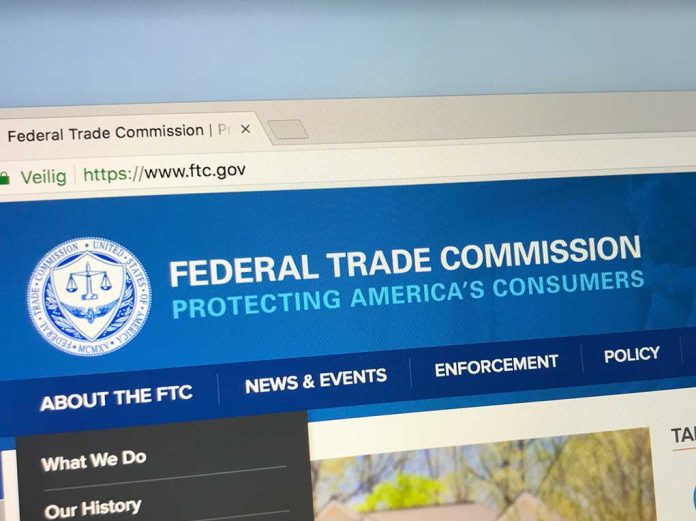
The FTC is cracking down on eye care practitioners who may be illegally withholding patients’ contact lens prescriptions, issuing warnings to 37 providers that could face civil penalties of up to $53,088 per violation.
Key Takeaways
- The FTC has sent warning letters to 37 contact lens prescribers for potential violations of the Contact Lens Rule which requires providing patients with their prescriptions.
- Eye care providers cannot charge additional fees for releasing prescriptions or force patients to purchase lenses from them.
- Violations can result in severe penalties including civil fines of up to $53,088 per violation.
- The enforcement aims to protect consumer choice and promote competition in the contact lens market.
Federal Watchdog Takes Aim at Prescription Gatekeeping
In a significant move to protect consumer rights, the Federal Trade Commission has issued warning letters to dozens of eye care practitioners suspected of violating regulations designed to give Americans freedom of choice when purchasing contact lenses. The federal agency sent 37 letters to prescribers who allegedly failed to provide patients with copies of their contact lens prescriptions after fittings – a clear requirement under the Contact Lens Rule. These violations effectively force consumers to purchase lenses from these providers rather than shopping around for better prices or more convenient options.
The FTC also sent a separate letter to Spectrum Vision Partners, LLC, closing an investigation but warning the company to comply with both the Contact Lens Rule and the Eyeglass Rule moving forward. According to complaints, Spectrum had been charging additional fees to patients who requested copies of their prescriptions, a practice explicitly prohibited by federal regulations. This gatekeeping behavior restricts consumer choice and limits market competition, allowing eye care providers to maintain artificially high prices According to the Federal Trade Commission.
Consumer Rights and Market Freedom at Stake
The Contact Lens Rule and Eyeglass Rule represent critical protections for American consumers who depend on corrective eyewear. These regulations ensure patients receive a copy of their prescription immediately after an eye exam, without requiring a specific request or paying additional fees. By guaranteeing access to prescriptions, these rules allow patients to purchase lenses or glasses from any vendor they choose—whether that’s a big-box retailer, online store, or another provider offering better prices. This freedom of choice is a fundamental principle of the free market that the Biden administration has oddly chosen to enforce.
Eye care practitioners are explicitly prohibited from requiring patients to sign waivers or purchase products directly from them. They cannot charge for the prescription itself or create obstacles that make it difficult for patients to take their business elsewhere. The warning letters make clear that these requirements apply even when exams are provided for free or conducted for purposes other than obtaining a prescription. This comprehensive approach ensures that consumers maintain their rights regardless of the circumstances surrounding their eye examination, Stated Lens Rule and Eyeglass Rule.
Serious Consequences for Non-Compliance
While the current warning letters do not constitute formal determinations of rule violations, they serve as a clear shot across the bow for the eye care industry. The FTC made plain that continued non-compliance could result in legal action, including administrative subpoenas and civil penalties reaching up to $53,088 per violation. For practices with numerous patients, these penalties could quickly become financially devastating, potentially putting offenders out of business for what some might consider a minor regulatory issue.
The investigation into Spectrum Vision Partners highlights the agency’s approach. Though the FTC closed its investigation without immediate action, the company was put on notice that charging fees specifically to patients who request their prescriptions constitutes a violation. This approach—warning first but threatening substantial penalties—demonstrates how regulatory agencies continue to maintain leverage over healthcare providers through complex and sometimes burdensome rule enforcement, even when the underlying principle of consumer choice is one conservatives typically support, Stated FTC.
Reporting Violations and Consumer Awareness
The FTC is actively encouraging consumers to report any difficulties in obtaining their prescriptions by visiting ReportFraud.ftc.gov. By collecting these complaints, the agency can identify patterns of non-compliance and target future enforcement actions. This citizen-reporting mechanism effectively turns patients into regulatory enforcers, creating additional pressure on eye care providers to comply with federal rules. For many small practices already struggling with administrative burdens, this adds another layer of compliance requirements to navigate.
For consumers, understanding these rights is crucial. Many Americans remain unaware that they are entitled to receive their prescriptions automatically, without asking or paying extra. The FTC has published guidance on its website explaining these rights and the obligations of eye care providers. By increasing awareness, the agency hopes to empower consumers to advocate for themselves while simultaneously putting pressure on the industry to follow regulations that ultimately promote market competition—a rare instance where regulatory enforcement actually serves to free up markets rather than restrict them.



